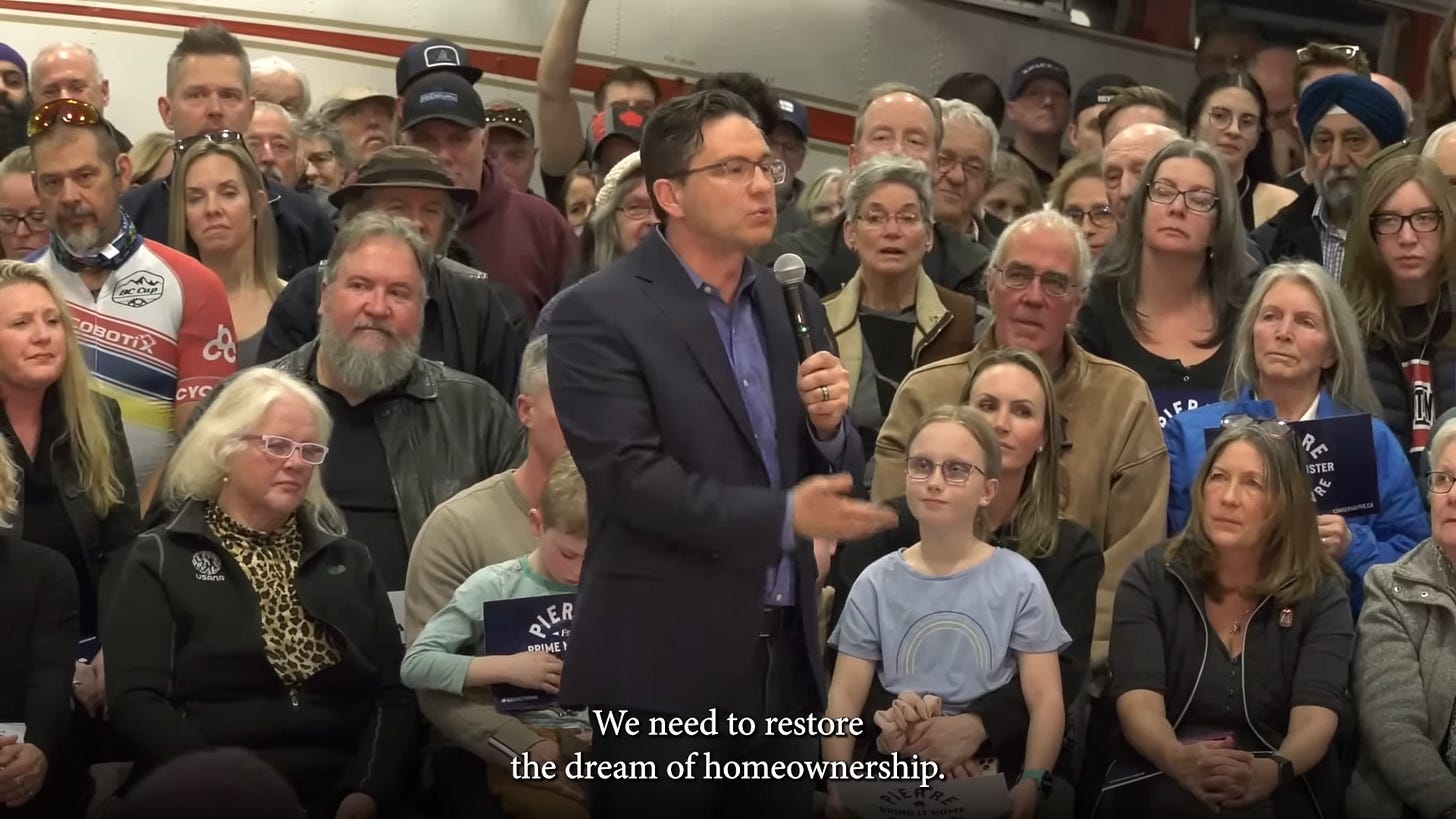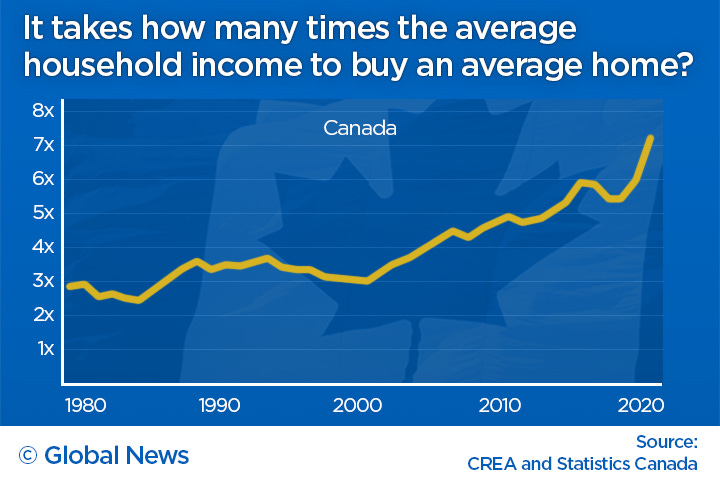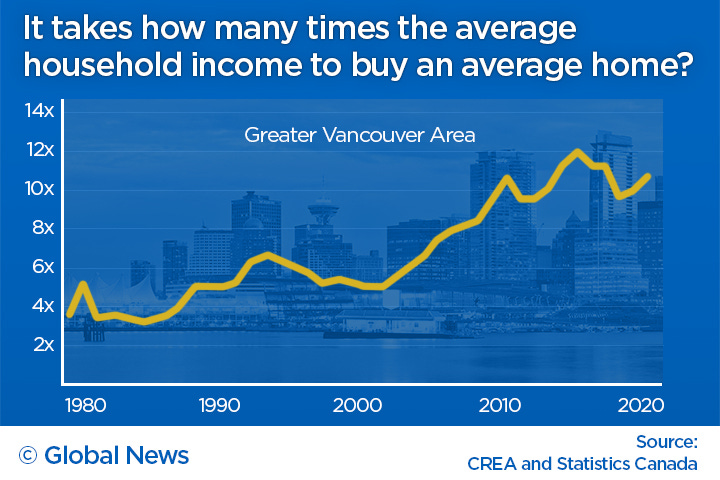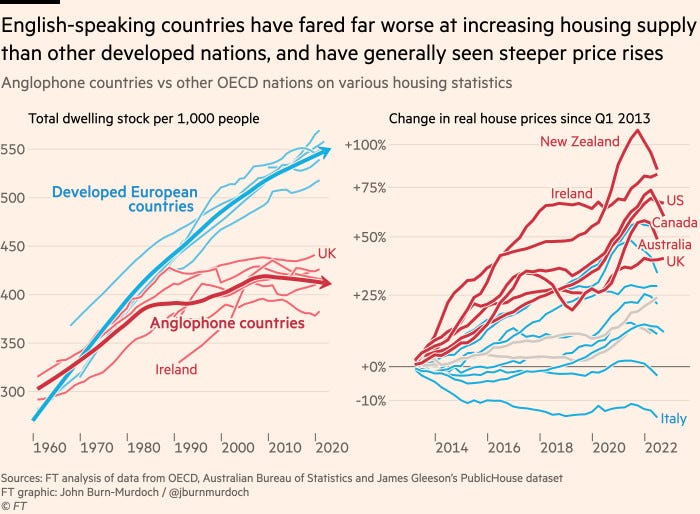Go West, young man 🇨🇦⛵🇬🇧
The future of British conservatism depends upon it
Washington [D.C] is not a place to live in. The rents are high, the food is bad, the dust is disgusting and the morals are deplorable.
Go West, young man, go West and grow up with the country.
- Horace Greeley1
Under King Charles III, the leader of the Conservative Party stands before his country fulminating against high housing costs, and berating the role of the privileged and government in causing them. He hasn’t just mentioned extortionate rents or historically high house prices a few times in passing, or when pestered in interviews — overcoming this policy failure is actively emphasised as a core pillar of his ideological vision and his mission for government. His arguments are grounded in a practical, earthy conservatism and he’s unafraid of articulating a conservative vision for the future of his country to the general public, or to the despatch box. If anything, he is famous for pugnaciously defending his values and political philosophy.
No, Rishi Sunak hasn’t suddenly discovered a soul, a coherent and workable ideology, or found the ability to paint an inspirational political philosophy with words. But this description isn’t a YIMBY2 fever dream — it is reality. The Tory leader in question, however, clearly isn’t British — even if they share a monarch. It’s Pierre Poilievre, who heads the Conservative Party of Canada. And he really is saying these things, in overtly political, yet approachable, human language. It’s not dense policy paper speak, it’s highly personal and speaks to individuals and their dreams and aspirations, not departmental spreadsheets.

As part of his campaign to become the leader of the Conservative Party of Canada (which he later achieved with a resounding majority of the votes cast), Poilievre tweeted this video3 in April 2022.
In the video, Poilievre laments that this modest ‘piece of heaven’ (again, note the lack of snobbery for a humble, [formerly] working class home, something that Westminster MPs would struggle with on both sides of the House) is marketable for nearly $5 million4. In the video, he says:
Back when this was built, it was probably a family with a very modest income, [that] could have afforded that piece of heaven for themselves. And I don’t say that facetiously. It would have been a wonderful, cute little house to live in for a working family. They could have, with the wage of a trucker and a waitress probably, bought that house 40 years ago, and paid off the mortgage in a reasonable time-frame.
But now, 40 years later, we look around and say: ‘Could young people with a similar working class background own the exact same house?’ And the answer is no. Why is that? Aren’t we supposed to be moving forward? Shouldn’t our working class be better off today than it was 40 years ago?
Why is it that we were able to house a family of a modest income in a house like that four decades ago, and now, even when you subdivided it into six units instead of one, it’s still not affordable for a working class Canadian.
The system is broken. It protects the privileged. The cost of government is driving up the cost of living.

How utterly alien to British political culture that the leader of the Conservative Party, not just a random and lonely backbench MP, can openly and enthusiastically campaign for housing affordability — and against the wealth and privilege of existing homeowners (the preeminent political constituency in the United Kingdom). But Poilievre is not just saying, as British Tories do, that ‘of course we need more houses’ while doing the square root of fuck all to facilitate their empty words. He adds:
Why is it that Vancouver has the third most unaffordable housing market on planet Earth? According to the C.D. Howe Institute, the governmental cost for every single unit of housing in Vancouver is $644k. That’s the cost of getting your approval, getting the zoning changed, getting the permit and paying all the fees directly to the city, and to the many consultants you have to hire to get it done.
These government gatekeepers protect the wealthy. They get wealthier and wealthier by the day as their limited and scarce property goes up in value.
But the working class person who can’t actually pay his or her bills, let alone save for a mortgage finds their purchasing power go down and down. Their wages are actually worth less.

Oh my god! An actual argument being made! That’s a novelty in of itself to British ears — even from the Labour Party, which is mostly campaigning on a soft Things Should Be More Better platform, rather than telling a compelling political narrative. Poilievre is offering a genuine and comprehensive vocalisation of why we are where we are, made directly to the public, not endlessly circled in policy institute papers.
And not just any argument, but a conservative argument for housebuilding. A conservative argument that also challenges established wealth and power structures and champions aspiration. One that focuses on the role of local government-facilitated suppression of supply on housing affordability. This is a position a liberal, free market conservative should be completely comfortable taking and communicating. It contains echoes of Thatcherism. Yet British Tories wouldn’t dream of such articulation, fearful of the negative reaction of their core constituency of elderly, homeowing boomers. Poilievre continues:
On the supply side a Poilievre government would require municipalities like Vancouver to speed up building permits and reduce the governmental cost associated with building things.
My message to City Hall here in Vancouver is remove the gatekeepers, stop blocking the poor, the working class and our immigrants from the privilege of owning a home here in this country. It used to be a right, and it should be again. If you’re prepared to work hard, you should be able to own a house.
How interesting to see what many would claim to be classically populist political arguments, targeting established institutions, being made to the young, rather than the middle-aged and elderly. It’s also a populist argument based in facts, not pure emotion — 1) young people can’t afford housing, and 2) government regulation plays a central role in suppression of housing supply.
Poilievre is well-known for his pseudo-Trumpian contempt of ‘Liberal gatekeepers’ (the Liberal Party is Canada’s main centre-to-centre left party) and ‘Ottawa elites’, and was labelled the attack dog of former PM Stephen Harper by his opponents. But intriguingly, he doesn’t seem to direct his ‘populist’ anger at the dispossessed and vulnerable like Trump or (more euphemistically) recent British Tories — he’s punching up, not down.
Robyn Urback wrote in the The Globe and Mail newspaper in April last year:
His tone is perfect for the swaths of young Canadians who have done everything right, but who not only can’t afford to live where they grew up, likely can’t even afford to live hours away.
Instead of blaming high house prices on immigrants, the habitual, comfort-zone target of British Tories, his ire instead seems directed at the Sensibles™. We have Sensibles™ in Britain too — the kind of politician that breathed a sigh of relief that Sunak, the management consultant’s PM, was back in charge after the Liz Truss debacle. Never mind that the preceding decade and a half was a lamentable failure of stagnant productivity, wages and growth, combined with great increases in the cost of living for the young. ‘Thank goodness people like us are back in charge.’

After these stagnant outcomes, Sensibles™ ought to be a bit more introspective about the value of their contribution to political outcomes. It’s clear that Canada’s Sensibles™ can’t stand Poilievre — but they have created precisely the environment for someone like him to flourish in. I don’t particularly subscribe to all of his views — I see the worth in a federally funded broadcasting institution, his enthusiasm for crypto is at the light end of fruity, and he’s dipped a toe in the shallow end of the World Economic Forum (WEF) conspiracy pool.
But if he were to enter government on the realistically fulfillable promise of housing affordability — a leading cause of the kind of wealth inequality that actively encourages conspiracy politics to begin with, why should I care about these side issues? That’s not just a question to me, that’s a question that has far bigger implications for big-L Canadian Liberals and small-l liberals alike.
Does a muggle actually care about obscure views on crypto and its implications for central banking and monetary policy, or are they more concerned with their own life and household budgets, and what has happened to those household budgets recently or relative to their parents at the same age? If he can sell a coherent vision solving for that, Liberals and liberals are toast in the long run, as more young people run into the concrete wall of Canadian housing affordability.
In short: don’t fucking whine about populists going after the institutions that your type of people own when a normal couple from a normal background with normal lives can’t afford to buy a normal home and have a normal family, you dumb fuck. What were you expecting? What reason do they have to buy into your institutions that haven’t delivered for them?
Poilievre’s exchange in the video above with Canada’s incumbent prime minister, Justin Trudeau, typifies this faith in institutions that are failing the young, locked out of all of the promises of the postwar 20th century. Is all this expenditure of federal money — taxpayer’s money — in subsidies and grants and bureaucratic government processes actually leading to affordable housing? As Poilievre says: ‘In other words, we should forgive him because he fails expensively!’
In another video, standing in front of activists, he moves beyond the pure finances of housing, and examines its indignity the infantilisation of young adults. He says: ‘I asked a crowd in Vancouver: “What do you do if you’re 35 and you’re living in your mom’s basement. How do you even bring home a date?” And a lady said: “Very carefully!”’ He doesn’t just want you to have an affordable home, he wants you to shag in it too! This is the politics of dreams. Shinzo Abe looks down with pride upon his young padawan.
I’m tired of British Conservatives whining about how difficult it all is and doing nothing to change trajectory. It’s like they think politics is something that happens to them, rather than something it is their solemn obligation to lead. Andrew Marr quoted a member of Sir Kier Starmer’s team after the 4th May local election results: ‘The worst thing the Tories have done is the destruction of hope — the sense that we have to accept that this is us — that we are poorer and going downhill; and that big change is no longer possible.’
Meanwhile, the Canadian Tories are proposing to link federal infrastructure spending to concrete housebuilding results, and actively facing down NIMBY5 city governments with policy sticks! The Triumph of Janet noted how the only way to change outcomes was to change incentive structures. Well, Poilievre is certainly offering that: free markets for social justice, the most underutilised policy platform in western politics. The Conservative Party of Canada website offers these policies:
Require unaffordable big cities like Vancouver to increase homebuilding by 15% annually or face big financial penalties and have portions of their federal funding withheld
Impose a NIMBY penalty on big city gatekeepers for egregious cases of NIMBYism. We will empower residents to file complaints about NIMBYism with the federal infrastructure department. When complaints are well-founded, we will withhold infrastructure dollars until municipalities remove the blockage and allow homebuilding to take place
Reward cities who are removing gatekeepers and getting homes built by providing a building bonus for municipalities who boost homebuilding
Require cities seeking federal funds pre-approve building permits for high-density housing and employment on all available land surrounding transit stations
Sell off 15 percent of the federal government’s 37,000 buildings. We will require these buildings to be turned into affordable housing
The British Tories offer perhaps the reheated, discredited and inflationary gruel of Help to Buy, and little else. It is for me now to consider, as a free market, young, liberal conservative, whether I now vote Labour as a fuck you to the Conservative Party in the next general election. Starmer is making all the right noises to make that a positive, not begrudged choice. Certainly, there are risks in taking in the NIMBYs head on, as the graveyard of ambitious DLUHC6 secretaries proves. But the British Conservative Party is now at great risk of not just conceding aspiration, but throwing it at the Labour Party, which is increasingly speaking the same language as Canadian Tories.
The 45th Canadian federal election will take place on or before October 20, 2025. The next British general election will take place on or before 28th January 2025. Perhaps it’s unfair to compare a party on course to sit on the opposition benches after 13 years of government, to one on course for a victory after a sustained period of Liberal dominance. But that doesn’t mean there will be no instructive lessons from the next Canadian federal elections, that British Conservatives would do well to take notes from. It seems Labour might have already learned the lessons from the West.
Or perhaps not, though the sentiment remains the same: https://blog.genealogybank.com/fact-or-myth-did-horace-greeley-really-say-go-west-young-man.htmlhttps://blog.genealogybank.com/fact-or-myth-did-horace-greeley-really-say-go-west-young-man.html
Yes In My Back Yard (YIMBY)
Which I have included as an embedded YouTube video here because Elon Musk is a manchild, and stopped Twitter’s API facilitating embedded tweets on Substack. Twat.
Canadian dollars (CAD)
Not In My Back Yard (NIMBY)
Department for Levelling Up, Housing and Communities (DHLUC)



Suggestion:
In Western Canada, have a look at Calgary. OK economy, good universities, nice architecture, and . . . the mountains. Canmore is also nice if you can make it work career wise. Cold winters but beautiful summers.
House wise, Vancouver is very expensive and out of reach unless you've got a couple of million bucks lying around.